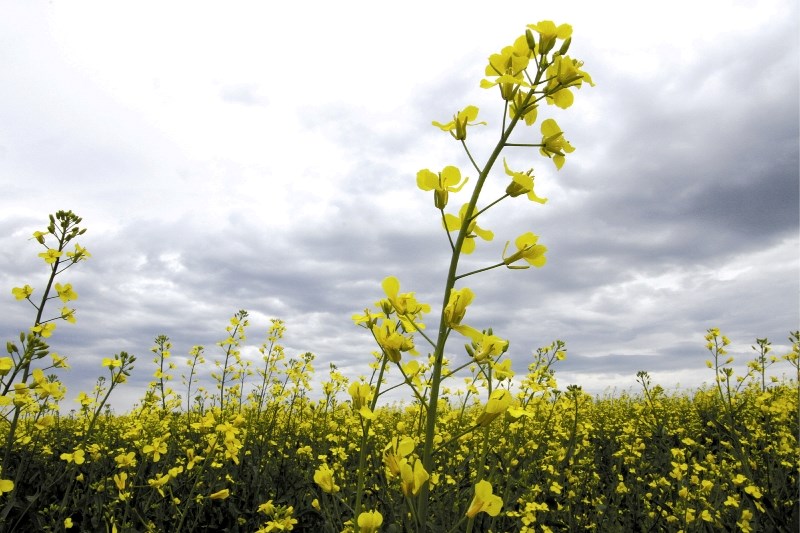Impact Of Canada-China Relations On Canola Imports

Table of Contents
Historical Overview of Canada-China Canola Trade
Canada's canola exports to China have experienced a dramatic trajectory, marked by periods of substantial growth followed by significant disruption. Canola, a major Canadian export, rapidly gained prominence in the Chinese market due to its high oil content and suitability for various food and industrial applications. The early years of trade witnessed a strong partnership, with steadily increasing volumes and value reflecting a mutually beneficial relationship.
- Early years of trade growth and partnership: The early 2000s saw a rapid expansion of Canada-China canola trade, establishing Canada as a key supplier to the burgeoning Chinese market.
- Increase in Canadian canola market share in China: Canadian canola secured a dominant position in the Chinese market, becoming a preferred source due to quality and reliability.
- Economic benefits for both countries: The trade generated substantial economic benefits for both nations, supporting jobs and growth in the agricultural sectors of both Canada and China. This mutually beneficial trade relationship contributed significantly to the overall bilateral economic ties.
Impact of Political Disputes on Canola Imports
Unfortunately, the strong Canada-China canola trade relationship has been repeatedly challenged by escalating political tensions. Specific diplomatic incidents and disagreements have directly impacted canola imports, creating instability and uncertainty.
- Examples of specific trade disputes (e.g., Meng Wanzhou arrest): The arrest of Meng Wanzhou, CFO of Huawei, in Vancouver in 2018, significantly strained Canada-China relations, leading to retaliatory actions from China against various Canadian exports, including canola.
- Imposition of tariffs and trade restrictions on Canadian canola: China imposed tariffs and various trade restrictions, citing concerns about pest contamination, hindering Canadian canola shipments and causing substantial financial losses. These actions significantly disrupted the established trade flow.
- Economic repercussions for Canadian farmers and the agricultural sector: Canadian canola farmers faced severe economic hardship due to reduced export opportunities and plummeting prices. Job losses throughout the supply chain added to the overall negative impact.
- Shift in Canadian export markets due to Chinese restrictions: The need to find alternative markets forced Canadian producers and exporters to diversify their focus, incurring additional costs and logistical challenges.
Economic Consequences for Canada
The economic consequences for Canada resulting from the disruptions in Canada-China canola trade have been substantial.
- Job losses in the agricultural sector: Thousands of jobs were impacted directly and indirectly across the entire agricultural sector, from farming to processing and transportation.
- Reduced farm income and financial hardship: Many Canadian canola farmers experienced significant income reductions, leading to financial hardship and impacting their long-term sustainability.
- Government aid packages and diversification strategies: The Canadian government responded with aid packages and programs designed to support affected farmers and encourage diversification of export markets. These initiatives aimed to mitigate the immediate economic impact and build resilience for the future.
Diversification Strategies for Canadian Canola Exporters
In response to the challenges posed by disrupted trade with China, Canadian canola exporters have actively pursued diversification strategies.
- Increased exports to other Asian countries (e.g., India, Japan): Canadian exporters aggressively targeted alternative markets in Asia, including India, Japan, South Korea, and others.
- Developing new markets in Europe and South America: Efforts were made to penetrate new markets in Europe and South America, exploring new trade partnerships and agreements.
- Investment in value-added canola products: Investment in processing canola into value-added products, such as canola oil and meal, increased market diversification and reduced reliance on raw commodity exports.
- Strengthening trade agreements with alternative partners: Canada actively pursued and strengthened trade agreements with other countries to facilitate access to new markets and reduce trade barriers.
Future Outlook for Canada-China Canola Trade
The future of Canada-China canola trade remains uncertain, dependent on the trajectory of bilateral relations.
- Predictions for future trade volume between the two countries: Predicting future trade volumes is challenging, subject to ongoing geopolitical developments and the broader global economic landscape.
- Potential for future trade disputes and their impacts: The potential for future trade disputes remains a significant risk, requiring ongoing monitoring and proactive risk management strategies.
- The role of international trade agreements and diplomacy: International trade agreements and effective diplomatic efforts play crucial roles in mitigating risks and fostering a more stable trading environment.
Conclusion:
The relationship between Canada and China has demonstrably impacted the flow of Canadian canola imports. While significant economic challenges have arisen from trade disputes, Canadian exporters have shown resilience through diversification and innovation. The future of Canada-China canola trade remains uncertain, highlighting the need for continuous monitoring of diplomatic relations and proactive strategies to mitigate risks. Understanding the impact of Canada-China relations on canola imports is crucial for farmers, exporters, and policymakers alike. Further research into mitigating the impact of geopolitical risks on Canada-China canola trade is vital for ensuring the long-term sustainability of this important agricultural sector. Proactive strategies to diversify markets and strengthen relationships with alternative trading partners are essential for securing the future of Canada-China canola trade and mitigating potential risks.

Featured Posts
-
 Dijon Ou Donner Ses Cheveux
May 09, 2025
Dijon Ou Donner Ses Cheveux
May 09, 2025 -
 Champions League Semi Final Draw Barcelona Inter Arsenal And Psg Dates Confirmed
May 09, 2025
Champions League Semi Final Draw Barcelona Inter Arsenal And Psg Dates Confirmed
May 09, 2025 -
 Analyzing The Great Decoupling Trends And Forecasts For The Future
May 09, 2025
Analyzing The Great Decoupling Trends And Forecasts For The Future
May 09, 2025 -
 Uk Visa Crackdown Stricter Rules For Work And Student Visas
May 09, 2025
Uk Visa Crackdown Stricter Rules For Work And Student Visas
May 09, 2025 -
 Sensex Recovers 100 Points Higher Nifty Above 17 950 Live Updates
May 09, 2025
Sensex Recovers 100 Points Higher Nifty Above 17 950 Live Updates
May 09, 2025
